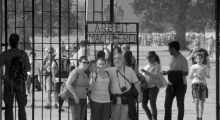TIFF
-
TIFF Critic’s Notebook 4: Austerlitz, Planetarium, Tramps

Sergei Loznitsa’s Austerlitz, a record of tourists visiting the Sachsenhausen concentration camp, could be loglined as a movie about why it’s a transparently bad idea to take selfies at Holocaust sites, but that would be reductive and far too banal a point to need making at feature length. The film is in low-contrast black-and-white, and how could it be in color? The visual language of extant Holocaust footage is B&W, so Loznitsa maintains visual and historical continuity. The opening movement is not that far off from, of all things, In the City of Sylvia, with long shots of tourists milling about in multiple compressed planes the […]
by Vadim Rizov on Sep 11, 2016 -
TIFF Critic’s Notebook 3: Hermia & Helena, The Dreamed Ones, Graduation

Matías Piñeiro has been living in NYC for a few years now, so it’s logical he’d eventually make a film set at least partially there. I can’t pretend to a lack of rooting interest: I know, casually or closely, a semi-significant number of people who worked on or acted in this, did a set report (meaning I spent part of the first viewing waiting to see what was actually being said in the shot I saw filmed) and, if you go to a lot of rep cinema in the city, Piñeiro — a serious, inveterate cinephile — is just kind of generally around. Hermia […]
by Vadim Rizov on Sep 10, 2016 -
TIFF Critic’s Notebook 2: Nocturama, A Decent Woman, The Red Turtle

When Bertrand Bonello’s Nocturama was conspicuously rejected from Cannes, fest director Thierry Frémaux wouldn’t comment on its absence: was he simply currently leery of any images of mass explosions in Paris, or was there something more offensive to the film? Nocturama is to some (arguable) degree a shallow movie with a flippant/trivializing attitude, rejecting the default gravity granted its subject, which means someone will definitely get upset about the film. It’s also a highly recommended, original and (this may seem like the wrong word, but it’s true) fun work. It’s impossible to discuss Nocturama without getting into the split between its first and second half, which shouldn’t count as […]
by Vadim Rizov on Sep 9, 2016 -
TIFF Critic’s Notebook 1: Neruda, Toni Erdmann, Julieta

Pablo Larraín really and seriously screws up for the first time with Neruda. Few saw or recall the existence of his debut, 2006’s Fuga, which received a middling response on the festival circuit; I seem to recall interviews around the time of 2008’s amusingly appalling (and vice-versa) reputation-establisher Tony Manero where Larraín said Fuga‘s indifferent reception prompted him to rethink a rather conventional aesthetic and come up with something inescapably different. Each film since his coming-out has, in variously scabrous ways, dealt with Pinochet’s legacy: Manero and Post Mortem taking place at the moment of his coup, the late-’80s-set No a crowdpleasingly cynical comedy re: the political machinations around the dictator’s removal via referendum. Jumping to the present, The […]
by Vadim Rizov on Sep 8, 2016




